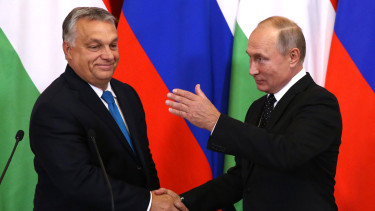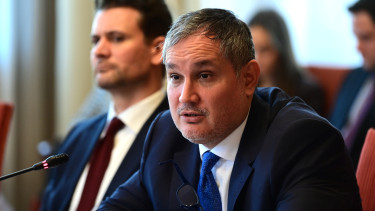Brussels reacts to Hungarian rap over slow vaccine purchases

The information shared by the EU executive today are not new, they have been in the open for quite some time, yet they seem to have been overlooked by Hungarian government officials, including Péter Szijjártó, Minister of Foreign Affairs and Trade, who has rapped Brussels today for the "scandalously slow" procurement of COVID-19 vaccines.
Here's a list of key data the Commission has highlighted today:
At the European Council in June 2020, EU Member States mandated the Commission to organise the joint procurement of vaccines. As a result, the European Commission has started talks with the most promising vaccine manufacturers.
"Centralising vaccine procurement at EU level has the merit of speed and efficiency by comparison with 27 separate processes. A truly European approach would avoid competition between Member States. It creates solidarity between all Member States, irrespective of the size of their population and their purchasing power. A pan-EU approach will increase the EU’s leverage when negotiating with industry. It will also enable us to combine the scientific and regulatory expertise of the Commission and the Member States," says the 17 June EU Strategy for COVID-19 vaccines, all 27 member states agreed to.
Let me remind you that by approving the agreement (delegating the negotiations to the EU), you agreed not to launch your own procedures for the purchase of vaccines with the same laboratories
, launched the Commissioner in Health Stella Kyriakides, during a videoconference with the European Ministers of Health on Wednesday. This provision was included in a “legally binding” annex of 18 June.
“I understand the pressures at national level and the anguish of your citizens (…) but concluding side agreements will only undermine a European approach which has borne fruit”, she added.
One of the two pillars the the strategy rests on was securing sufficient production of vaccines in the EU and thereby sufficient supplies for its Member States through Advance Purchase Agreements (APAs) with vaccine producers via the Emergency Support Instrument (ESI ).
The Commission has mobilised funds to increase the production capacity of the suppliers that it signed APAs with. It has provided more than €2 billion from the Emergency Support Instrument. Member States have agreed to contribute an additional €750 million.
An important point and principle is that the price of the vaccine is the same for all EU Member States. Also, the EU support reduces the price Member States need to pay for the vaccines.
The Commission jointly with a Joint Negotiation Team carries out the negotiations with vaccine suppliers. The members of the Joint Negotiation Team – representing seven Member States - are appointed by a Steering Committee. The Steering Committee discusses and reviews all aspects of the Advanced Purchase Agreement (APA) contracts before signature. All EU Member States are represented in this Committee, which meets on a weekly basis.
The EU has secured 2.3 billion doses, based on the agreements with six different companies: AstraZeneca, Sanofi–GSK, Janssen, BioNtech–Pfizer, CureVac and Moderna. The EU is continuing discussinos with US-based Novavax and Franco-Austrian Valneva, so Europe could get up to 2.5 billion doses.
A vaccine developer that wishes to put a vaccine on the market in the EU needs to request a marketing authorisation for the vaccine. The request is submitted to the European Medicines Agency (EMA), which assesses the safety, efficacy and quality of the vaccine. If the EMA gives a positive recommendation, the Commission can proceed with the authorisation of the vaccine on the EU market.
Marketing authorisation has so far been given to vaccines produced by BioNTech/Pfizer and Moderna.
The European Medicines Agency (EMA) and the Commission are making full use of the provisions under EU legislation for emergency situations to speed up the procedure for approval, whilst fully ensuring that all requirements in terms of efficacy, quality and safety of the vaccine are fully assessed.
Based on APAs, Member States individually negotiate with the producers the timing, target location and volume of vaccine deliveries.The timing of such shipments depend exclusively on the manufacturing capacity of the producers. Shipments are expected to be accelerated as certain producers step up their output capacities and as conditional marketing authorisations will be granted to the vaccines of additional producers.
Member States had also agreed in June not to engage in separate talks with vaccine producers, possibly outbidding each other. This was to ensure that vaccines are equally available across the EU proportionate to population sizes and smaller Member States would not be in at disadvantage to larger countries that can reserve larger quantities.
There is, however, no ban on Member States negotiating with producers with whom the EU has no APAs, and if need be issue an emergency authorisation - at its own risk - for the marketing and use of vaccines acquired this way, the Commission added.
Want to know more? Good.
Questions & Answers on vaccine negotiations.
Conditional Marketing Authorisation of COVID-19 Vaccines in the EU.
Cover photo: Getty Images







